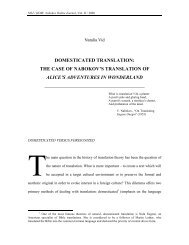Nabokov's Invitation to Plato's Beheading
Nabokov's Invitation to Plato's Beheading
Nabokov's Invitation to Plato's Beheading
- TAGS
- beheading
- etc.dal.ca
Create successful ePaper yourself
Turn your PDF publications into a flip-book with our unique Google optimized e-Paper software.
A. Moudrov. “Nabokov’s <strong>Invitation</strong> <strong>to</strong> Pla<strong>to</strong>’s <strong>Beheading</strong>”<br />
optimistic signs and reassurances, which all but state with certainty that Cincinnatus<br />
embraces immortality at the moment of his execution, it would be wrong take them at<br />
their face value.<br />
Nabokov, like Pla<strong>to</strong> before him, constantly suggests that hope for immortality is<br />
no more than a dream which, in the cases of Cincinnatus and Socrates, always slips away.<br />
No matter how promising, such hope invariably casts a shadow of pessimism. Just a few<br />
moments after he arrives at a realization that his dream world must exist (93),<br />
Cincinnatus’ hope bursts: “I think I have caught my prey. . . but it is only a fleeting<br />
apparition of my prey!” (94). He is consequently compared <strong>to</strong> “a man grieving because<br />
he has recently lost in his dreams some thing that he had never found in reality, or hoping<br />
that <strong>to</strong>morrow he would dream that he had found it again” (205). It is “the dead end of<br />
this life” (205), the narra<strong>to</strong>r says, and crossing out the word “death,” which some<br />
commenta<strong>to</strong>rs interpreted as a triumphant conquest of death, is in fact a dubious gesture<br />
of hope and despair. It seems that the best Cincinnatus might do while contemplating his<br />
afterlife is <strong>to</strong> adopt a playful (but hardly hopeful) attitude <strong>to</strong>ward his doubts about<br />
immortality which John Shade, Nabokov’s poet in Pale Fire, calls the “grand pota<strong>to</strong>,” a<br />
pun on the grand peut-être, the big if (52). The afterlife, Nabokov’s characters and<br />
Socrates know, can be easily turned in<strong>to</strong> an object of wild and uncontrollable speculation<br />
which for Nabokov and Pla<strong>to</strong> had very little <strong>to</strong> do with the orderliness of imagination.<br />
One cannot, therefore, reduce Nabokov’s tribute <strong>to</strong> this themes <strong>to</strong> a manageable<br />
subject of a discussion. We are warned against concluding that Cincinnatus’ ghost,<br />
whatever it may be, survived his execution. Strange as Nabokov’s world is, we can find a<br />
ghost, but no immortality. The ghost can tell us a s<strong>to</strong>ry of his life, but nothing about
















